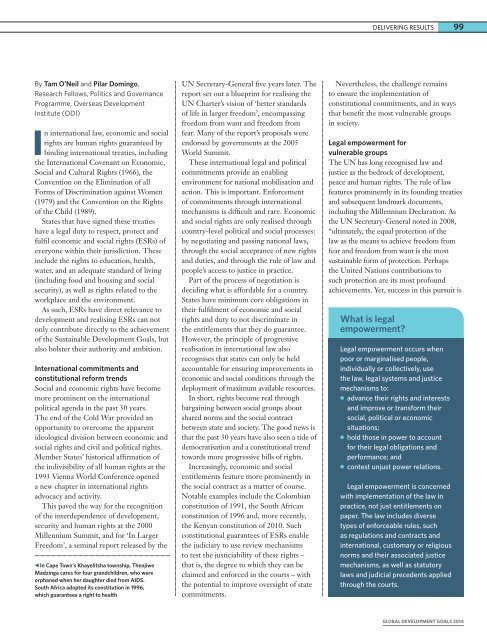FAMBB
FAMBB
FAMBB
Create successful ePaper yourself
Turn your PDF publications into a flip-book with our unique Google optimized e-Paper software.
DELIVERING RESULTS99By Tam O’Neil and Pilar Domingo,Research Fellows, Politics and GovernanceProgramme, Overseas DevelopmentInstitute (ODI)In international law, economic and socialrights are human rights guaranteed bybinding international treaties, includingthe International Covenant on Economic,Social and Cultural Rights (1966), theConvention on the Elimination of allForms of Discrimination against Women(1979) and the Convention on the Rightsof the Child (1989).States that have signed these treatieshave a legal duty to respect, protect andfulfil economic and social rights (ESRs) ofeveryone within their jurisdiction. Theseinclude the rights to education, health,water, and an adequate standard of living(including food and housing and socialsecurity), as well as rights related to theworkplace and the environment.As such, ESRs have direct relevance todevelopment and realising ESRs can notonly contribute directly to the achievementof the Sustainable Development Goals, butalso bolster their authority and ambition.International commitments andconstitutional reform trendsSocial and economic rights have becomemore prominent on the internationalpolitical agenda in the past 30 years.The end of the Cold War provided anopportunity to overcome the apparentideological division between economic andsocial rights and civil and political rights.Member States’ historical affirmation ofthe indivisibility of all human rights at the1993 Vienna World Conference openeda new chapter in international rightsadvocacy and activity.This paved the way for the recognitionof the interdependence of development,security and human rights at the 2000Millennium Summit, and for ‘In LargerFreedom’, a seminal report released by theIn Cape Town’s Khayelitsha township, ThenjiweMadzinga cares for four grandchildren, who wereorphaned when her daughter died from AIDS.South Africa adopted its constitution in 1996,which guarantees a right to healthUN Secretary-General five years later. Thereport set out a blueprint for realising theUN Charter’s vision of ‘better standardsof life in larger freedom’, encompassingfreedom from want and freedom fromfear. Many of the report’s proposals wereendorsed by governments at the 2005World Summit.These international legal and politicalcommitments provide an enablingenvironment for national mobilisation andaction. This is important. Enforcementof commitments through internationalmechanisms is difficult and rare. Economicand social rights are only realised throughcountry-level political and social processes:by negotiating and passing national laws,through the social acceptance of new rightsand duties, and through the rule of law andpeople’s access to justice in practice.Part of the process of negotiation isdeciding what is affordable for a country.States have minimum core obligations intheir fulfilment of economic and socialrights and duty to not discriminate inthe entitlements that they do guarantee.However, the principle of progressiverealisation in international law alsorecognises that states can only be heldaccountable for ensuring improvements ineconomic and social conditions through thedeployment of maximum available resources.In short, rights become real throughbargaining between social groups aboutshared norms and the social contractbetween state and society. The good news isthat the past 30 years have also seen a tide ofdemocratisation and a constitutional trendtowards more progressive bills of rights.Increasingly, economic and socialentitlements feature more prominently inthe social contract as a matter of course.Notable examples include the Colombianconstitution of 1991, the South Africanconstitution of 1996 and, more recently,the Kenyan constitution of 2010. Suchconstitutional guarantees of ESRs enablethe judiciary to use review mechanismsto test the justiciability of these rights –that is, the degree to which they can beclaimed and enforced in the courts – withthe potential to improve oversight of statecommitments.Nevertheless, the challenge remainsto ensure the implementation ofconstitutional commitments, and in waysthat benefit the most vulnerable groupsin society.Legal empowerment forvulnerable groupsThe UN has long recognised law andjustice as the bedrock of development,peace and human rights. The rule of lawfeatures prominently in its founding treatiesand subsequent landmark documents,including the Millennium Declaration. Asthe UN Secretary-General noted in 2008,“ultimately, the equal protection of thelaw as the means to achieve freedom fromfear and freedom from want is the mostsustainable form of protection. Perhapsthe United Nations contributions tosuch protection are its most profoundachievements. Yet, success in this pursuit isWhat is legalempowerment?Legal empowerment occurs whenpoor or marginalised people,individually or collectively, usethe law, legal systems and justicemechanisms to:●●advance their rights and interestsand improve or transform theirsocial, political or economicsituations;●●hold those in power to accountfor their legal obligations andperformance; and●●contest unjust power relations.Legal empowerment is concernedwith implementation of the law inpractice, not just entitlements onpaper. The law includes diversetypes of enforceable rules, suchas regulations and contracts andinternational, customary or religiousnorms and their associated justicemechanisms, as well as statutorylaws and judicial precedents appliedthrough the courts.GLOBAL DEVELOPMENT GOALS 2014


